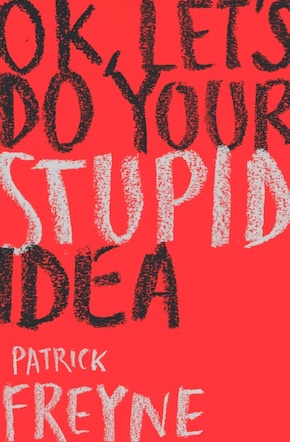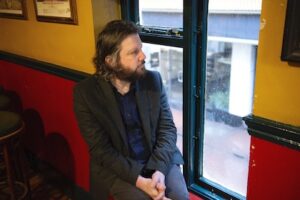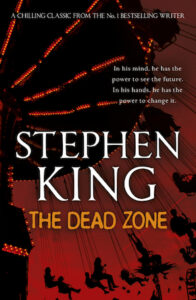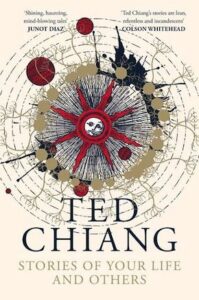To do or not to do
by Patrick Freyne
“Hilariously, painfully, Freynefully brilliant.” Joseph O’Connor
The Irish Times features writer, failed rock star and author of OK, Let’s Do Your Stupid Idea reflects on some significant life, career and reading choices, names some of his literary, comedy and comic-book influences, and grapples with organising a writing regime and grasping an idea before it breaks free.
Where are you now?
In the small yard in the back of a former council house in Marino in Dublin where I live with my wife Anna because the sun is going down and it’s unseasonably warm for September.
Where and when do you do most of your writing?
In our dining room or in a concrete shed in the aforementioned yard that my competent father turned into a handy study. He’s very good with his hands, whereas for me, hands are just flappy things my typing fingers are plugged into.
How would you summarise your lockdown experience?
At the start it was interesting, because I was writing a lot about how it was affecting society for The Irish Times. Then it was strangely calming, because I’m an anxious person so I find group anxiety solidarity-building. Later I felt sad about what was happening. Then I was heartened by singing evenings with some friends over Zoom. Then I was sad and exasperated because I missed my friends and family. But then our neighbours organised bimonthly street bingo and singalongs at which old ladies sang dirty songs and young men sang folk harmonies and I love singing (I wrote an essay about it in the book) so that made me feel a sense of solidarity again. But then I got used that and I went back to sadness. I’ve been juggling some combination all of those feelings since.
If you have one, what is your pre-writing ritual?
I make coffee, then stumble to my writing armchair. It’s best for me to sneak up on myself before I realise what’s happening. The first thing I do is make a to-do list which I do with great determination, digging the biro into the page. Those to-do lists are my real art, I think.
Full-time or part-time?
I’m a journalist with The Irish Times so I’m a full-time writer in that respect, but I write essays and fiction on weekends, evenings and holidays.
For actual writing as opposed to note-making – a keyboard. I think my bad handwriting technically qualifies me to be a doctor, or at least a dentist. My scrawl would make a handwriting analysist instantly murder me, like the psychic in Stephen King’s The Dead Zone. When I write notes in my notebook, I have to do it very slowly to be legible or else I have to type what’s in the notebook into my laptop really quickly before the meaning is lost to time.
How do you relax when you’re writing?
I cover the clock on my computer with a scrap of paper so I don’t know the time and I pretend that Twitter and other social media platforms have been shut down by a utopian socialist one-world government and that all the trolls have got girlfriends and boyfriends and socially constructive jobs.
How would you pitch your latest book in up to 25 words?
A series of consolingly funny, sad and funny/sad essays that take the reader through the mishaps, happy accidents, tragedies and small victories in my life.
Who do you write for?
For myself, because if I don’t find it interesting, no one will. But also, hopefully for anyone who wants to be helped, entertained or consoled.
Who do you share your work in progress with?
My wife, Anna Carey, an excellent YA writer. My brother, David Freyne, an excellent filmmaker. I show it to my oldest friend Corncrake occasionally but he says things like “I’d be more interested in this if you were a famous general.” So, on reflection, add “not Corncrake” to the previous “Who do you write for?” answer.
Which literary character do you wish you created?
I don’t think I could have created him but the ongoing cross-media existence of Alan Partridge through radio, TV, films, books and podcasts brings joy to my heart.
Share with us your favourite line/s of dialogue, poetry or prose.
There’s a bit at the end of a Neil Gaiman Sandman comic that my wife always finds consoling “I think hell might be a place, but you don’t have to stay anywhere forever.”
Which book do you wish you’d written?
The Prime of Miss Jean Brodie by Muriel Spark is a perfect book but me wishing I’d written it is like my cat wishing she’d written it: tragic, weird and confusing.
Which book/s have you most recently read and enjoyed?
Deborah Levy’s oddly life-affirming memoir The Cost of Living; My wife Anna Carey’s new book about early twentieth-century collective action, The Boldness of Betty; Doireann Ní Ghríofa’s beautiful memoir-meets-biography of an 18th-century Irish-language poet, A Ghost in the Throat; John Crowley’s cult fantasy novel Little Big.
What’s on your bedside table or e-reader?
A pile of half-read books that are so abandoned, I’ve forgotten what they were. I start around twice as many as I finish.
Which books do you feel you ought to have read but haven’t yet?
Everyone says Ulysses but I completed a module on Joyce in Trinity College Dublin and still managed to not read it. I think I even answered a question on it in the exam. I really should read Ulysses. I’m a disgrace.
Which book/s do you treasure the most?
Douglas Adams’ The Hitchhiker’s Guide to the Galaxy, Sue Townsend’s The Secret Diary of Adrian Mole, Aged 13¾ and the comic 2000AD (in its 1980s incarnation) probably did as much as any other literature to shape me.
What is the last work you read in translation?
I’ve been rereading Labyrinths by Jorges Luis Borges (translated largely by James Irby) because I think he was on to something.
Which story collections would you particularly recommend?
The long, intricate stories in Ted Chiang’s The Story of Your Life and Others contain such perfectly realised ideas, beautifully structured universes and humane instincts that I always recommend it to people who think they don’t like science fiction.
What will you read next?
Dune by Frank Herbert because sci-fi is my go-to comfort genre and I like the weird David Lynch film and there’s a new adaptation on the way. I have a horrible feeling that it might be too late, and that it’s something I would have loved aged fifteen but which will annoy me now. But who knows, there’s a seemingly infinite amount of Dune sequels and maybe in a year’s time I’ll have read nothing else.
What are you working on next?
I was writing short stories before this essay collection took shape and for a long time I was alternating writing short stories with writing essays. So possibly a book of short stories. I’d also like to try a book of reportage at some point
Imagine you’re the host of a literary supper, who would your dinner guests be (living or dead, real or fictional)?
Muriel Spark, Clive James and Margaret Atwood because they’d keep the conversation flowing, and also Bill and Ted from the Bill & Ted films so they could say things like, “That’s awesome, Margaret Atwood!” and “No way, Muriel Spark!”
If you weren’t writing you’d be…?
More useful, probably. Through my journalism I’ve met a lot of clever smart young people from marginalised backgrounds and I think I’d like to be working with them in some way.
 Patrick Freyne spent most of his twenties trying to be a rock star before turning to the much more stable and secure world of journalism. He is a features writer at The Irish Times. OK, Let’s Do Your Stupid Idea, his first book, is published by Sandycove/Penguin Books in paperback, eBook and audio download.
Patrick Freyne spent most of his twenties trying to be a rock star before turning to the much more stable and secure world of journalism. He is a features writer at The Irish Times. OK, Let’s Do Your Stupid Idea, his first book, is published by Sandycove/Penguin Books in paperback, eBook and audio download.
Read more
@PatrickFreyne1
The Irish Times
Author portrait © Chris Maddaloni



